Abstract
PlayerUnknown's Battlegrounds or best known as PUBG is one of the most famous online multiplayer games nowadays. Being on the market only for a short period of time is enough to make it a big global success. One of the best features embedded on the game is the audio/ voice chat feature that enables the players to communicate verbally with their teammates. This feature not only makes the game more interesting, but it also gives a great help to the players to send instructions or give information when they are on their virtual battlefield. In addition, the server does not only allow players to play among people within the same region or country, but it also allows the players to play the game with people from other countries. This leaves the players with no choice but to get out from their comfort zone and start talking to people from different places around the world who absolutely have different styles of conversing and cultures. Thus, the main aims of this research are to analyze the regularity of players using audio/ voice chat feature on PUBG and to study how the game is used to enhance intercultural communication. The data is taken from a set of questionnaires that has been distributed to 251 respondents from a local university by using random sampling. Factors that lead to exposure and development of intercultural communication that were identified based on the findings may improve the use of the feature to enhance intercultural communication.
Keywords: Intercultural communication, mobile learning, online game, PUBG, speaking skills
Introduction
History of PUBG and its gameplay
Online-based games have become very popular in our world today. Besides the avid gaming community, the existence of online video games has increased the number of players among the masses. The easy and rapid development of the internet has made this possible (Khairunisa, 2020). One of the many online games that benefited from this scenario is PUBG. ‘PlayerUnknown’s Battle Ground’, commonly known and identified as ‘PUBG’ is an online video game categorised under the first-person shooter (FPS) gameplay. FPS gameplay focuses on weapon-based combat that is organised from the first-person perspective (Rhee et al., 2019).
Since its release in 2017, PUBG has gained worldwide success and its popularity is evident in its player count where the number has surpassed popular video games such as Grand Theft Auto V, Fallout 4 and DOTA 2. Besides FPS, there are various features of PUBG that contributed to its success. The incorporation of its ‘battle royale’ concept and online multiplayer gameplay mode (Lokesh & Lakshmi, 2020) has significantly influenced players’ interest in playing the game. The multiplayer gameplay mode has promoted collaborative nature among players (Khairunisa, 2020) thus creating a low-stress and anxiety-free environment among players to communicate (Azman & Farhana Dollsaid, 2018). Kowert et al. (2014) found that the online gaming spaces provided in an online game such as PUBG are seen as socially accommodating, thus easing the communication barriers. Furthermore, Xu et al. (2018) have identified that PUBG’s game design has given players social experience through interactive features provided by the game. This enables players from different backgrounds and cultures to communicate with each other, hence creating intercultural communication amongst the players.
Previous studies on benefits of playing PUBG
The game of PUBG has created headlines and highlights across the world since it was first introduced to the world in 2017. Its game design was led by Brendan Greene based on a Japanese film, ‘Battle Royale’. It has become a point of discussion among people across age, culture and social barriers. Due to its popularity, e-sport tournaments on this game have also been organised across countries. Even after 5 years of its inception into the world of online gaming, the number of studies made upon the issues related with PUBG maintains popular among researchers. A systematic review conducted by Adnan and Azairi (2021) shows that studies on PUBG in Malaysia remains significantly high in numbers due to the increasing number of keywords related with the subject of PUBG.
In the spectrum of communication, the view upon gaming was generally negative at first. This can be seen in significant number of studies portrays that gaming has affect the ability and chances for an individual to communicate effectively with the people around him or her (Fox et al., 2018; Ferguson & Colwell, 2020; Teng et al., 2014). However, recent studies are focused on the potential of online games such as PUBG in contributing to the development of the players in various aspects due to the change in online gaming. The online gaming development in the last decade has enriched its players’ gaming experience through complexity, diversity, realistic gameplay and social nature offered in the game (Granic et al., 2014; Johannes et al., 2021; Sahi & Bhagat, 2019).
Bulduklu (2019) summarised five (5) main benefits of online games such as PUBG which include; satisfaction, challenges, addiction, escape and social interaction. In elaborating the benefits, Bulduklu argued that players gained emotional stimulant from the gameplay apart from allowing players to indulge in various levels of achievement. While doing that, players would also be able to relieve stress and enjoy doing things that they would never be able to do in real life. Most importantly, this type of gaming allows the players to create an atmosphere of communication via multiple communication tools made available in online games such as PUBG.
PUBG offers communication tools via audio chat through its voice chat and quick chat audio made available for all players. Other than that, it also allows the players to communicate via text-chat feature. These communication tools are seen to be one of the strongest features of the FPS online game, resulting a very popular and addictive gameplay (Al-Mansour, 2019). In his study, Al-Mansour found that the communication features in PUBG encourages exchanges of thoughts and opinions, which contributed to the development of players’ strategies and tactics. This includes ways to survive through stealth, cooperation, sacrifice, isolation and confrontation (Dagdee & Philip, 2019). In discussing on these various strategies and tactics to make sure their team of four (4) players are able to defeat the other teams and win the ‘battle royale’, players would have to communicate through the communication feature available in PUBG. This involves players who come from different cultures and do not know each other. Hence, intercultural communication among players occurs.
People around the world have been living, practicing their cultures that they acquire from their environment that include both psychological and social factors which then shape their identity (Merino & Tileagă, 2011). People may experience differences in communication if they talk to people who are not from the same place as them. Intercultural communication has always been defined as a communication that happens among individuals of different national cultures (Stephen et al., 2015).
PlayerUnknown's Battleground or PUBG connects people on virtual battlefield by giving them the chance to play together as long as there is internet connection. The server does not only connect people of the same place or country, but players can also play the game with other players from other countries. This makes the game even more interesting as players will get the chance to interact with people around the world virtually. Virtual interaction gives the players confidence that they will be able to interact more comfortably (Liaw, 2019). In addition, virtual interactions could also enhance language learning and at the same time enhance the flexibility in terms of language usage which makes it easier to talk to people with different backgrounds and cultures (Liaw, 2019).
Research Questions
This study questions:
How frequent do players use the audio/ voice chat feature embedded in PUBG?
How PUBG is used to enhance intercultural communication?
Purpose of the Study
This study aims to reveal the regularity or frequency of players using the audio/ voice chat feature on PUBG and its use to improve intercultural communication.
Research Methods
This study was conducted at a local university in Tapah, Perak. A set of questionnaires was distributed to 251 students of various courses from three different faculties which are Faculty of Applied Science, Faculty of Accountancy and Faculty of Science and Computational Mathematics. The participants were picked randomly from undergraduate students who were familiar with the online game. They were asked to answer a few close-ended questions specifically to get the information about the regularity of them playing the game and how do they use the audio chat features that is embedded in the game. They were also instructed to answer a few open-ended questions that were then used as qualitative data to support the data gained from the close-ended or the quantitative part.
Findings
The findings below are the results gained from a set of questionnaires distributed to respondents at the site of study as mentioned in the methodology section. The results of selected items that are related to the topic are tabulated in the form of bar graphs to better compare the scales chosen by respondents.
Use of audio/ voice chat features
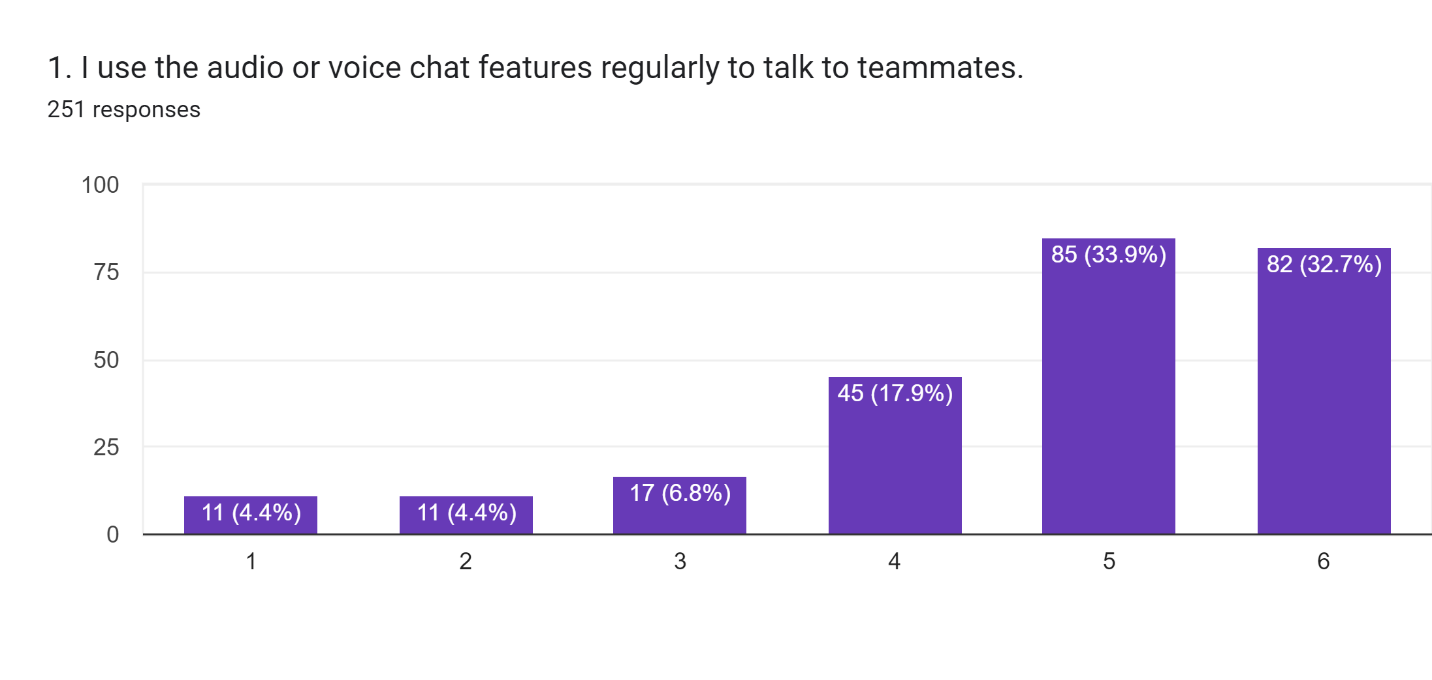
Figure 1 above shows the regularity of students who use the feature of audio or voice chatting when they play the game with their teammates. As shown, the majority of students who play the game use the feature regularly. 85 people which equal to 33.9% students answered, ‘agree’ and 82 people which equal to 32.7% students answered, ‘strongly agree’. Only a small number of 39 students, which equal to 15.6%, answered ‘strongly disagree’, ‘disagree’ and ‘slightly disagree’.
Based on the data tabulated on the bar graph, it is clearly shown that most of the students use the audio/ voice chat features on PUBG regularly when they are on the game. The feature makes the game even more interesting as the players can interact with teammates easily and the process of giving and receiving instructions or information can be done a lot easier.
Audio/ voice chat for intercultural communication
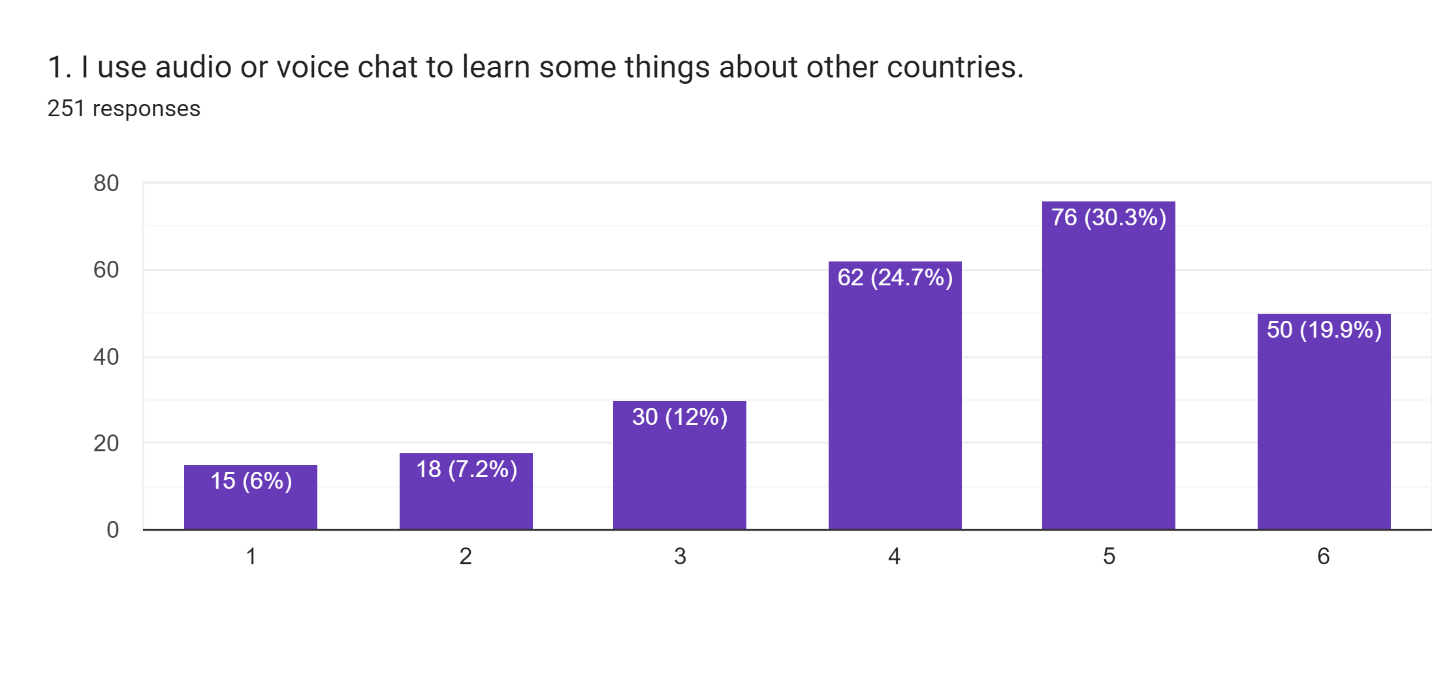
Figure 2 above shows the result of students who use audio or voice chat features to communicate with other players to learn about people from other countries. As mentioned previously, PUBG is an online game that can be played by everybody around the world who possesses a smartphone and has an internet connection. Based on the result shown above, 76 students or 30.3% said ‘agree’ to the statement. 50 students or 19.9% of them ‘strongly agree’ to the statement and 62 people, which equal to 24.7% ‘slightly agree’ to the statement. There were only 15 students or 6% of them who strongly disagreed with the statement as they do not really use the feature to learn about people from countries.
The result shows that the majority of the students are interested in learning some things about people from other countries. This is very positive as they do not only play the game only for the fun that the game has in terms of gameplay, but they also look forward to learning a thing or two about their teammates that are randomly selected.
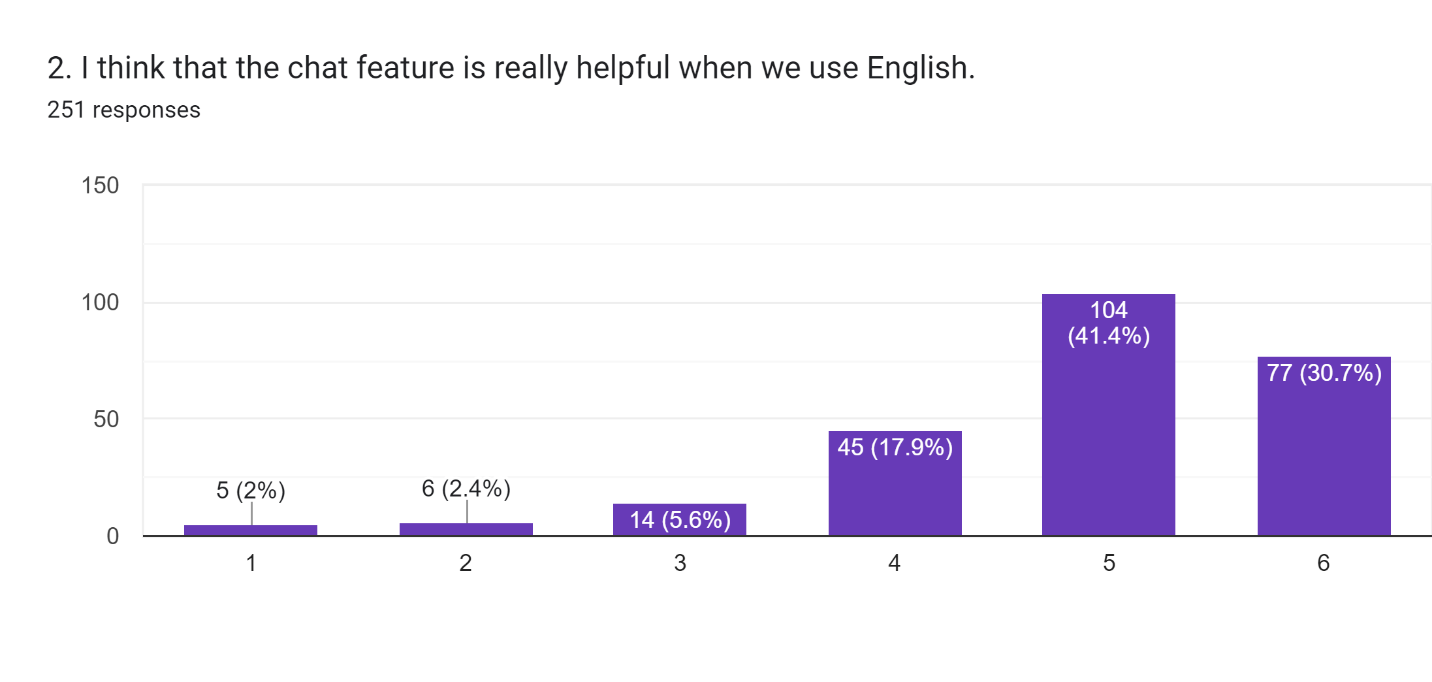
Figure 3 shows the result of students who think it is useful to use English when using audio chat feature on PUBG. The highest percentage is 41.4% (104 students) goes to students who answered ‘agree’ to the statement, followed by the second highest with a percentage of 30.7% (77 students) who answered ‘strongly agree’ to the statement. The lowest percentage of 2% (5 students) goes to students who answered, ‘strongly disagree’, followed by the second lowest which is 2.4% (6 students who answered ‘disagree’).
This shows that majority of the students feel comfortable using English as a medium of communication to converse with other players from other countries. This will not only enhance the ability to speak to people with different backgrounds and cultures, but it also helps to improve the language ability.
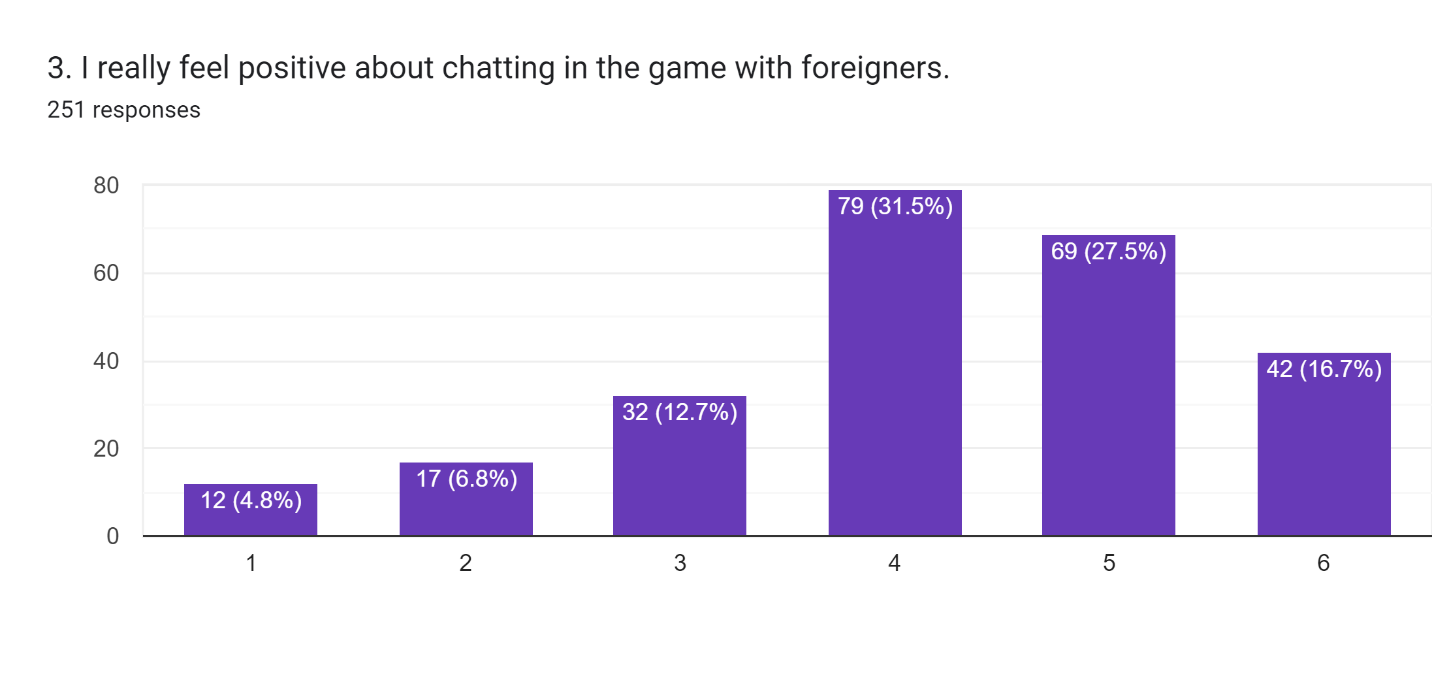
Figure 4 above shows the result of whether the students feel positive about chatting in the game with foreigners. As shown, majority of the students feel at least ‘slightly positive’ to chat in the game with foreigners with the percentage of 31.5% (79 students). 27.5% (69 students) and 16.7% (42 students) come from students who answered ‘agree’ and ‘strongly agree’.
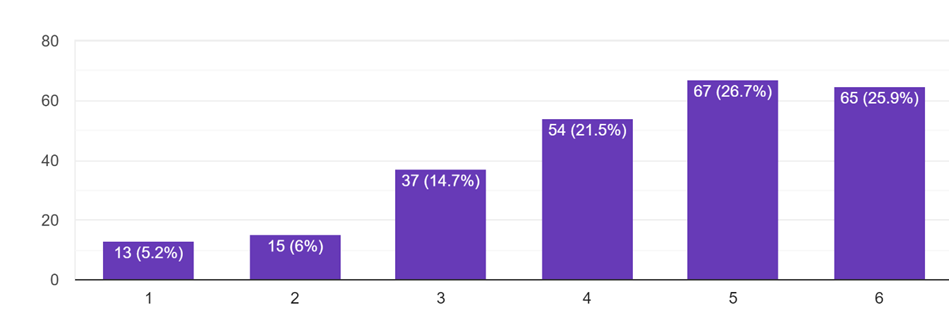
Figure 5 shows the result of whether the students think it is funny if there is miscommunication when conversing while playing the game. Majority of the students agree that they feel funny whenever there is miscommunication. The highest percentage for this item is 26.7% (67 students) that comes from those who answered ‘agree’. The second highest is 25.9% (65 students) that comes from those who answered, ‘strongly agree’.
This shows that they feel more comfortable when they talk to their teammates virtually. The nature of the activity is fun and entertaining, thus making the verbal mistakes funny.
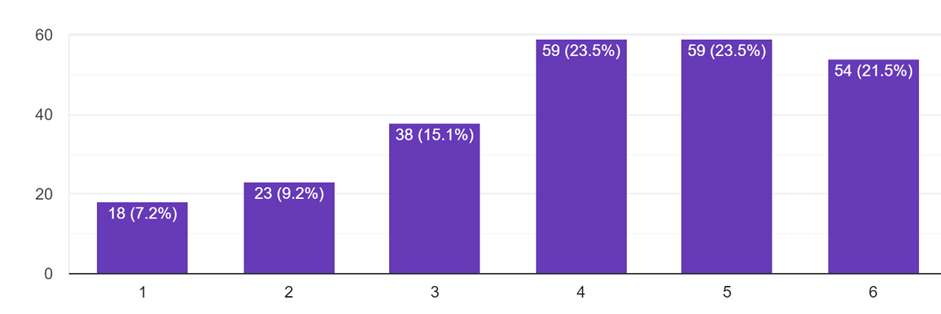
Bar graph 6 shows the statistics of the students’ hopes about including video chat features on PUBG.
As shown, majority of the students agreed that video chat features should be included in the game in future upgrade. The highest percentage for this item is 23.5% (59 students) for those who answered, ‘slightly agree’ and ‘agree’ respectively. The second highest goes to those who answered ‘strongly agree’ which is 21.5% (54 students). Number of students who answered, ‘strongly disagree’, ‘disagree’ and ‘slightly disagree’ combined is just 31.5% (79 students).
Conclusions
To sum up, the main aims of this research are to analyze the regularity of players using audio/ voice chat feature on PUBG and to study how the game is used to enhance intercultural communication. Based on the results as discussed above, more than half, majority of the students answered, ‘slightly agree’, ‘agree’ and ‘strongly agree’ to all 6 items asked in the questionnaire. This shows that they agree that audio/ voice chat feature on PUBG has been a great help for them to enhance their intercultural communication skills. They are always open to talk to anybody that is chosen to be in the same team regardless of their nationality. This shows that such feature really gives positive impact to the students.
References
Adnan, W. H., & Azairi, A. (2021). A systematic review on online gaming addiction and student’s behaviour in gaming: the case of playerunknown’s battlegrounds (PUBG) / Wardatul Hayat Adnan and Ateefa Azairi. https://forumkomunikasi.uitm.edu.my
Al-Mansour, J. (2019). The success behind the PUBG era: A case study perspective. Academy of Strategic Management Journal, 18(6).
Azman, H., & Farhana Dollsaid, N. (2018). Applying Massively Multiplayer Online Games (MMOGs) in EFL Teaching. Arab World English Journal, 9(4), 3-18. DOI:
Bulduklu, Y. (2019). Mobile games on the basis of uses and gratifications approach: A comparison of the mobile game habits of university and high school students. Convergence: The International Journal of Research into New Media Technologies, 25(5-6), 901-917. DOI:
Dagdee, P., & Philip, L. (2019). The rise of PUBG and the marketing strategies behind its success. International Journal of Scientific Research and Review, 07(03).
Ferguson, C. J., & Colwell, J. (2020). Lack of consensus among scholars on the issue of video game "addiction". Psychology of Popular Media, 9(3), 359-366. DOI:
Fox, J., Gilbert, M., & Tang, W. Y. (2018). Player experiences in a massively multiplayer online game: A diary study of performance, motivation, and social interaction. New Media and Society, 20(11). DOI:
Granic, I., Lobel, A., & Engels, R. C. M. E. (2014). The benefits of playing video games. American Psychologist, 69(1), 66-78. DOI:
Johannes, N., Vuorre, M., & Przybylski, A. K. (2021). Video game play is positively correlated with well-being. Royal Society Open Science, 8(2). DOI:
Khairunisa, A. A. (2020). Computer-Mediated Communication: Online Gaming Communication Culture. Proceedings of the 2nd Jogjakarta Communication Conference (JCC 2020). DOI:
Kowert, R., Domahidi, E., & Quandt, T. (2014). The Relationship Between Online Video Game Involvement and Gaming-Related Friendships Among Emotionally Sensitive Individuals. Cyberpsychology, Behavior, and Social Networking, 17(7), 447-453. DOI:
Liaw, M.-L. (2019). EFL learners’ intercultural communication in an open social virtual environment. Journal of Educational Technology & Society, 22(2), 38–55. https://www.jstor.org/stable/26819616
Lokesh, K. S., & Lakshmi, P. M. (2020). A study on addiction of PUBG game and its health issues among youth in Erode city. International Research Journal of Modernization in Engineering, 42(07).
Merino, M.-E., & Tileagă, C. (2011). The construction of ethnic minority identity: A discursive psychological approach to ethnic self-definition in action. Discourse & Society, 22(1), 86-101. DOI:
Rhee, H. K., Song, D. H., & Kim, J. H. (2019). Comparative analysis of first person shooter games on game modes and weapons - military-themed, overwatch, and player unknowns' battleground. Indonesian Journal of Electrical Engineering and Computer Science, 13(1), 116. DOI:
Sahi, M., & Bhagat, G. (2019). Positive effects of online games: A review. Journal of Critical Reviews, 6(3), 60–70.
Stephen, M. C., Mélodine, S., & Diyako, R. (2015). Intercultural communication: Where we’ve been, where we’re going, issues we face. Communication Research and Practice, 1(1), 71-87.
Teng, Z., Li, Y., & Liu, Y. (2014). Online gaming, internet addiction, and aggression in Chinese male students: The mediating role of low self-control. International Journal of Psychological Studies, 6(2). DOI:
Xu, Z., Xiang, M., & Pang, L. (2018). Study on the influence factors of college students’ loyalty in PUBG game. IOP Conference Series: Materials Science and Engineering, 439(3). DOI:
Copyright information

This work is licensed under a Creative Commons Attribution-NonCommercial-NoDerivatives 4.0 International License.
About this article
Publication Date
25 September 2023
Article Doi
eBook ISBN
978-1-80296-964-1
Publisher
European Publisher
Volume
7
Print ISBN (optional)
-
Edition Number
1st Edition
Pages
1-929
Subjects
Language, education, literature, linguistics
Cite this article as:
Salim, M. S. A. M., Adnan, A. H. M., Shah, D. S. M., Salim, M. N. F. M., Rani, M. S. A., & Kamarudin, S. (2023). ‘Playerunknown's Battlegrounds’ (PUBG) Online Multiplayer Audio Chats and Intercultural Competence. In M. Rahim, A. A. Ab Aziz, I. Saja @ Mearaj, N. A. Kamarudin, O. L. Chong, N. Zaini, A. Bidin, N. Mohamad Ayob, Z. Mohd Sulaiman, Y. S. Chan, & N. H. M. Saad (Eds.), Embracing Change: Emancipating the Landscape of Research in Linguistic, Language and Literature, vol 7. European Proceedings of Educational Sciences (pp. 829-836). European Publisher. https://doi.org/10.15405/epes.23097.74

